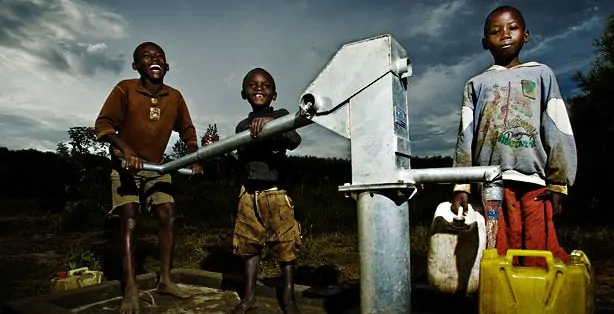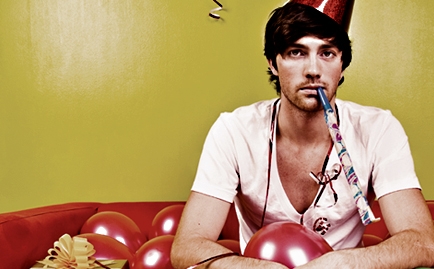
World Water Week kicked off this past Monday, March 22, with World Water Day. This week is set up by the United Nations to raise awareness about water and sanitation issues around the world. A major participant is Charity: Water, a social justice organization dedicated to bringing clean water to people all over the world. We talked to Scott Harrison, founder of Charity: Water, about what his organization has planned for today and about an exciting new effort to help Haiti recover from its devastating earthquake. Harrison, whose personal story is inspirational and astounding, spoke candidly and openly about the need for clean water/sanitation, their organization’s commitment to pursuing justice and how each of us can make a difference this World Water Week.
What are you all doing for World Water Week?
We are releasing a new campaign called Unshaken, and it’s a campaign to bring clean water to at least 40,000 people in Haiti. We had a commitment to Haiti before the earthquake, and after the earthquake hit, 1.3 million people were displaced from their homes in Port-au-Prince. So we’ve been working with our partners to find out how we can best continue to help, and we believe that is providing clean water in the rural areas that many of these people have fled to. We’re trying to bring what Charity: Water is really good at, which is transparency. So we’ve gone out into every one of these communities, taken photos, taken GPS, and we’ll publish this data publicly so people can see what the need is, what the solutions are and exactly how much it will cost. And the second thing is we’ll continue to use 100 percent of donations on these projects, no admin, no saving it up for future projects. Invisible Children kicked off this campaign with $100,000 donations sponsoring one of the villages. This is the first time we’ve ever done anything with them, and they actually came with me to Haiti a couple weeks ago.
What’s the water situation like in Haiti?
What has gotten worse is the communities, and the water sources in these rural areas have just become even more stressed by the influx. Families of six or seven are now families of 10 or 11 as they take in family members and friends from Port-au-Prince. The sources are not clean. They’re open springs most of the time, certainly not good for you. If you’re an adult, your body’s gotten a little used to it, so you’re getting diarrhea, but you’re not going to die of drinking that dirty water. If you’re a child under 5, you’re highly vulnerable to death by dysentery. What’s happening is the adults are coming from Port-au-Prince and they have absolutely no resistance to the country water, so many of them are getting violently ill if they drink that water.
How many wells are you planting?
There are 11 water systems, eight in Haiti’s central plateau and three in the island of La Gonave. And it’s an island about two hours off of the coast where 60,000 people got on boats and fled. So 11 different areas where 40,000 people live. We are basically larger mountain systems taking mountain springs, cleaning them and then using gravity to take them down to the villages.
How can people get involved with Unshaken?
We’re looking for a lot of awareness, and we’re looking for donations at the corporate or group level where a company or church might try to sponsor one of these 11 communities. Or maybe a five or 10 dollar level, where five or 10 bucks goes directly into helping buy a piece of people for one of these areas. And really just for people to spread the word. It’s the best video we’ve done, really captures the reality on the ground, and also it’s very hopeful. The Haitian people are amazing, and this is an opportunity for us to stand alongside them and build back better. The wells are about 90 to 100 thousand each. It’s something a little new for us. We’re really just trying to go overboard with transparency on this one.
How do you go about building a water system?
Imagine a big mountain spring sort of high up, and right now people are trekking up maybe a half-hour up the mountain to an open source of water. So what we do is, through our local partners, we build basically a big concrete box around that water, so instead of just sitting there out in the open, it’s captured. And then we’ll build a second box right next to it, which is a sand filter. So the water will be filtered through sand, and then a reservoir next to it. And the reservoir will hold water. So the box is filling up first, and it’s going through sand and is cleaned, and the water was clean anyways, but sand is just a great natural filter. And then to the third reservoir. Then from there, it’s a system of pipes that are basically going down the mountain to tap stands in different parts of the community. So a community member will just walk up, turn on the tap, and clean water is coming out under pressure because it’s being forced from much higher up. We have two local NGOs on the ground that we’ve been working with. One is Partners In Health, and the second is Concern Worldwide. Both have been working in the country [for] I believe over 20 years. So the projects are all being led by locals, local masons and local communities.
What are ways beyond today that people can help the world get access to clean water?
We have a number of different programs. We have a really great school program at charitywater.org/schools that allows students to bring clean water and toilets directly to the schools in the developing world. Right now half of the world’s schools don’t have clean water, which is pretty unbelievable to think about. About 50 million schools. We’ve got a new website called My Charity Water that we’re really excited about that allows people to give up their birthday. Instead of asking for birthday gifts, they go out to their friends, talk about the story of clean water and then ask for their age in dollars. So a 19-year-old would ask for $19 in the hopes of building a well or part of a well. And this website, just in beta, has already raised $1.5 million just in the last six months. That’s something really everyone can do, whether you have money or not. We had a 7-year-old kid raise $20,000. We had an 81-year-old giving up her birthday so that more people could become 81 and live to her age.
Do you believe clean water for the world is a reality for our lifetime?
You know, I have to. I’m 34 now. I think I can get 100 million people clean water in the next 10 years, and there are a lot of other groups out there fighting to make that happen. The thing with water, there actually are solutions. There are tangible, cost-effective solutions. So it seems a little more in reach than the cure for a disease where we’re just not sure whether we’re going to get there. So I believe it’s a possibility, the question is whether we can raise the public’s will to make it a reality.






















